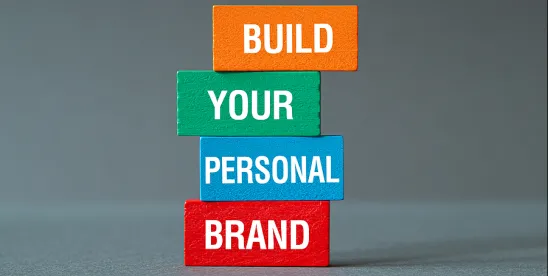In today’s professional landscape, developing a personal brand has become increasingly important for employees at all levels. For professionals working full-time, especially in the legal field, the idea of building a personal brand might seem daunting and risky.
Concerns about how it might be perceived by employers and colleagues, or worries about the potential implication that you’re job hunting, can make the endeavor seem more trouble than it’s worth. However, with the right approach, building your personal brand while maintaining a full-time job can lead to significant benefits for both employees and employers.
Why Building Your Personal Brand is Crucial
Building your personal brand is about more than just gaining followers on LinkedIn. It’s about establishing yourself as a thought leader in your industry, expanding your professional network, and opening up new career opportunities. Even if you’re happy in your current role, here’s why it’s essential:
- Professional Growth and Visibility: A strong personal brand can position you as an expert in your field. This can lead to invitations to speak at conferences, participate in podcasts and take on leadership roles within professional associations, among other opportunities.
- Networking Opportunities: Building your brand enables you to more strongly connect with other professionals, potential mentors, the media and industry leaders. These connections can be invaluable for career growth and development.
- Career Security: Having a strong personal brand is a good insurance policy. It ensures that you are recognized and valued beyond your current role, making you an attractive candidate for future opportunities that may come to you even when you’re not actively looking for them.
Benefits for Employers
Employers often worry that encouraging employees to build their personal brands might lead to increased turnover or distractions. However, the benefits far outweigh the risks:
- Employee Satisfaction and Retention: Employees who feel valued and recognized are more satisfied and loyal. Encouraging personal branding can enhance job satisfaction and reduce turnover.
- Recruitment Tool: Employees with strong personal brands can attract top talent to the company. Prospective employees are often drawn to companies with recognized experts and thought leaders.
- Enhanced Company Reputation: When employees build their brands, they increase the company’s visibility and credibility. This can lead to new business opportunities and stronger client relationships.
- Powerful Brand Ambassadors: Employees who actively share their positive experiences and insights about the company on social media can serve as powerful brand ambassadors. Their authentic testimonials can significantly enhance the company’s reputation and attract clients and talent.
How to Build Your Personal Brand as an Employee
Building a personal brand requires intentionality and effort. Here are some practical steps for employees to build their brand while respecting their full-time job commitments:
- Clarify Your Intentions: Communicate with your employer about your goals. Explain that you are focused on building your professional presence, not looking for a new job. Highlight how this can benefit the company through increased visibility and networking.
- Set Boundaries: Allocate specific times outside of work hours to engage on LinkedIn and other platforms. This ensures that your branding efforts do not interfere with your job responsibilities.
- Be Transparent: Keep your employer informed about your branding activities. Share how your personal brand can complement the company’s goals and values.
- Align Your Content: Focus on sharing industry knowledge, thought leadership and insights that align with your company’s values and mission. This demonstrates your commitment to your field and your employer.
- Leverage Company Resources: Take advantage of any personal branding training or resources your employer offers. These can provide valuable guidance and support in building your brand.
How Employers Can Support Employee Branding Efforts
Employers play a crucial role in fostering an environment where personal branding is encouraged and supported. Here are some ways employers can help:
- Provide Personal Branding Training: Offer training sessions and resources to help employees understand the importance of personal branding and how to do it effectively.
- Encourage Thought Leadership: Create opportunities for employees to share their expertise through company blogs, webinars and industry events.
- Recognize and Reward Branding Efforts: Acknowledge and reward employees who actively build their personal brands. This can be through formal recognition programs or informal shout-outs.
- Promote a Culture of Transparency: Encourage open communication about personal branding goals and activities. This helps to build trust and ensures that everyone is on the same page.
- Leverage Employee Brands for Company Benefit: Utilize the enhanced visibility and credibility of employees with strong personal brands to promote the company. Share and amplify their content through company channels.
The Power of Employees as Brand Ambassadors
When employees share positive stories about their experiences at a company, it resonates more authentically than traditional corporate marketing. Here’s why employees make powerful brand ambassadors:
- Authenticity: Employee testimonials and stories are perceived as more genuine and trustworthy. They provide a real, human perspective on what it’s like to work at the company.
- Increased Reach: Employees have their own networks, which can extend the company’s reach far beyond its own followers. When employees share company content, it can significantly increase visibility and engagement.
- Enhanced Employer Brand: Positive employee testimonials can enhance the company’s employer brand, making it more attractive to potential hires. It showcases the company as a great place to work, driven by passionate and engaged employees.
Key Takeaways to Successfully Building Your Personal Brand While Employed
Building a personal brand while working full-time doesn’t have to be a daunting task. With clear intentions, transparency and strategic alignment, employees can build their brands in a way that benefits both their careers and their employers. For employers, supporting these efforts can lead to happier, more engaged employees, enhanced company reputation and powerful brand ambassadors.
By fostering a culture that values and encourages personal branding, both employees and employers can achieve a win-win situation. Employees gain visibility and professional growth opportunities, while employers benefit from increased company visibility, improved recruitment and a stronger, more engaged workforce.




 />i
/>i

